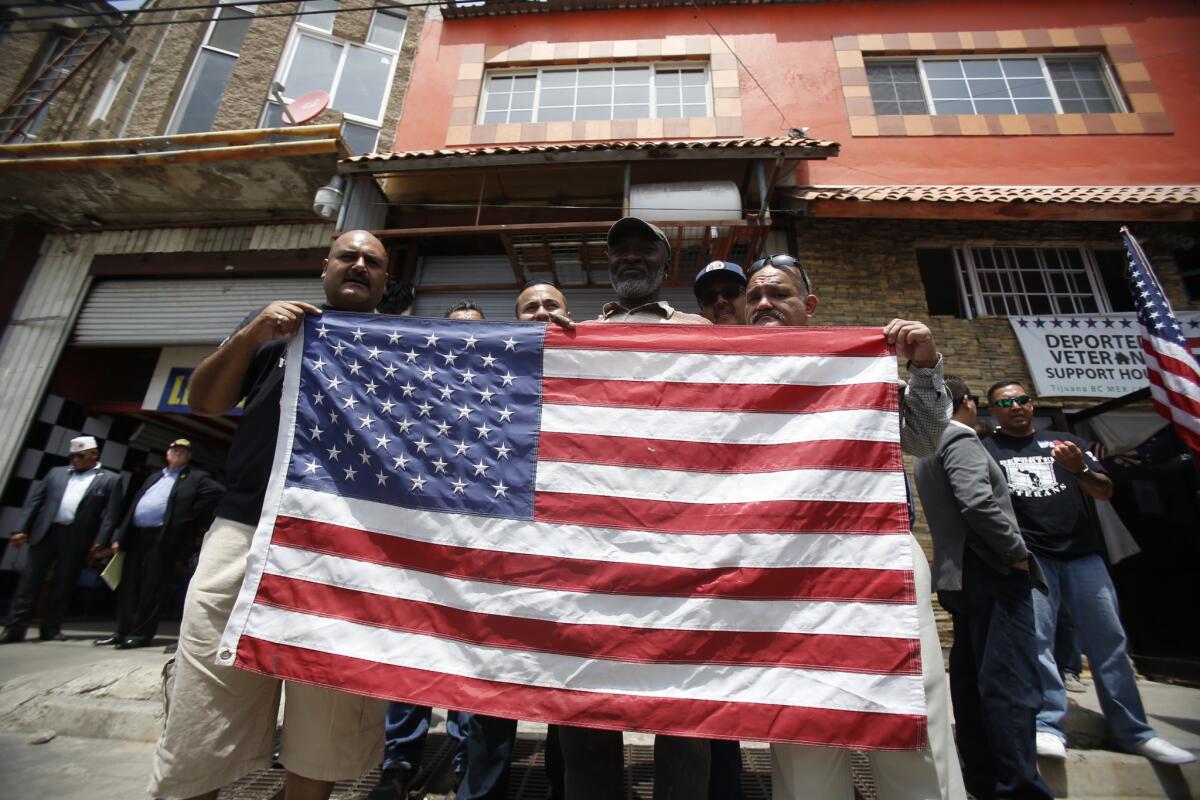U.S. military veterans deported to Mexico say they want to come back home

Reporting from Tijuana — Deported U.S. military veterans told members of a U.S. congressional delegation visiting Tijuana on Saturday that they had paid dearly for their crimes and wanted to come home.
“I committed a crime and I accept it,” said Eduardo Agustin Garcia, 59, a former U.S. Navy airman who grew up in Oxnard but was deported to Mexico in 1999 after serving a four-year sentence on a drug charge.
Garcia, who now works in a call center in Tijuana, was among a dozen deported veterans who spoke briefly to members of the U.S. House of Representatives, all Democrats on the Congressional Hispanic Caucus.
The deported veterans — some of whom served in Vietnam, Iraq and Afghanistan — told of the pride they had felt in the U.S. armed services. They talked about how they missed their families in the United States and needed access to Veterans Affairs services. “I just want to go home,” they repeatedly said.
Held at the Deported Veterans Support House near the U.S. border, the event aimed to bring visibility to this issue affecting lawful permanent residents who served in the military and were honorably discharged, but then were convicted of crimes. Because they had not become U.S. citizens, they were deported after serving their sentences, returning to a country that many had left as children.
The delegation, led by Hispanic Caucus Chairwoman Michelle Lujan Grisham of New Mexico and First Vice Chair Joaquin Castro of Texas, included three Californians: Lou Correa of Santa Ana, Nanette Barragán of San Pedro and Juan Vargas of San Diego. Also in the delegation were Raul Grijalva of Arizona and Vicente Gonzalez of Texas.
The visitors were given a tour of the center, which offers shelter and other support services to deported veterans. They also watched a documentary that profiled some of the veterans and told of their struggles in Mexico.
About 60 deported veterans live in the Tijuana area. In a report last year, the American Civil Liberties Union said there were at least 239 deported veterans in 34 countries.
“This is an injustice. These veterans fought for the United States,” said Correa. “They broke the law and paid for this mistake. You shouldn’t have to pay twice for the same sin.”
Castro presented the veterans with a U.S. flag that had been flown over the U.S. Capitol. “We can’t wait to get you guys home,” he said.
The presence of the legislators offered encouragement to the group. Vargas and Grijalva have submitted proposed legislation that would allow the vets to return to the United States and would take measures so that noncitizen members of the military are informed of their opportunities to become U.S. citizens. Two other members of the delegation are also preparing to propose legislation.
“This is an opportunity for Donald Trump to do something right,” said Vargas. “We weren’t able to get anywhere with the other administration, and we should have.”
Twitter: @sandradibble
Dibble writes for the San Diego Union-Tribune.
More to Read
Sign up for Essential California
The most important California stories and recommendations in your inbox every morning.
You may occasionally receive promotional content from the Los Angeles Times.










